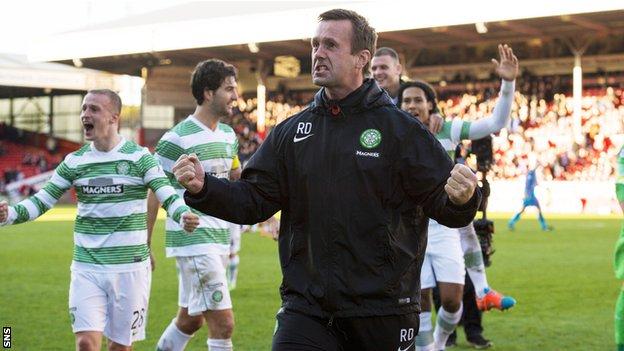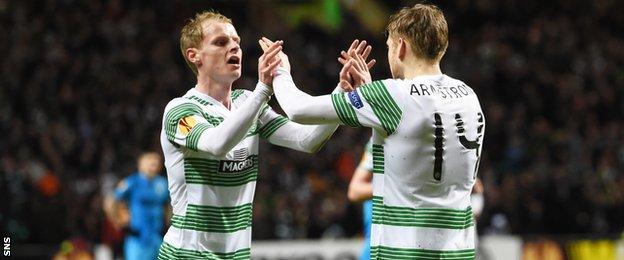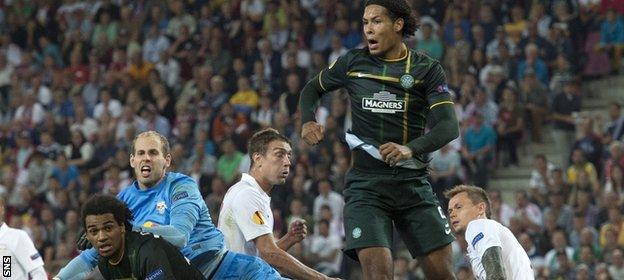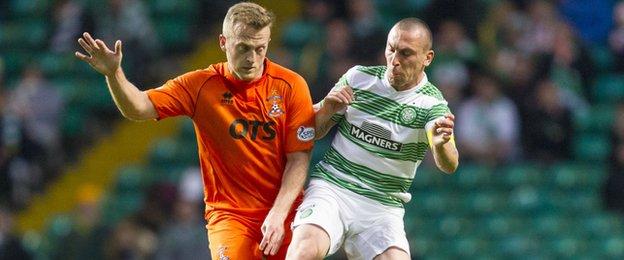Celtic: How Ronny Deila's side won the Scottish Premiership

Last updated on .From the section Football

The assumption was always that Celtic would win the league whatever the circumstances.
And, after Aberdeen lost to Dundee United on Saturday following Celtic's defeat of Dundee the night before, a fourth consecutive title success was confirmed.
There were moments of uncertainty early on about how the players were adapting to the methods and tactics of new manager Ronny Deila, but even then there remained a sense that the champions would prevail again.
That should not lessen the appreciation of their campaign, though.
Deila was a young manager, coming to a new country at 38, to take charge of a club that is by any measure an entirely different stature to his former side, Stromsgodset.
The Norwegian overachieved at his previous team, leading them to their first league title in 43 years and only the second in the club's history, but the demands at Celtic are well established. Fans expect trophies and clamour for progress in Europe.
So what were the key ingredients to Celtic's league win?

Consistency
The title win was built on consistency; from Deila remaining true to his own philosophies on playing style and player development, to the core of the starting line-up being the same throughout the season.
The opening two matches suggested that Celtic would immediately rekindle their authority, since St Johnstone were defeated 3-0 at McDiarmid Park and Dundee United were sliced apart in an impressive 6-1 victory at Celtic Park.
Yet there were faltering steps in the next two games, with a 1-0 defeat at Inverness - albeit with a much weakened side since the game fell between two midweek European ties - and a 1-1 draw at Dens Park. Those results contributed to the sense of their being an early struggle for Deila to overcome.
The side was taking shape, though, and only Eoghan O'Connell, Calum MacGregor, Beram Kayal and Jo Inge Berget would fall into the periphery from the opening games. For all that Celtic have greater resources and a larger squad than any of their domestic competitors, Deila found the reliability and aplomb he was seeking from a small group of players.
The team has always tended to contain Craig Gordon, Adam Matthews, Jason Denayer, Virgil van Dijk, Emilio Izaguirre, Scott Brown, Nir Bitton and Stefan Johansen. Freshness and rotation only really applied to the rest of the front line, which tended to be drawn from Kris Commons, Anthony Stokes, James Forrest, Leigh Griffiths, John Guidetti and - when they arrived from Dundee United in January - Gary Mackay-Steven and Stuart Armstrong.

Results were also reliable. After the loss at Inverness, Celtic only suffered three further defeats in the league.
They also twice put together runs of eight consecutive Premiership victories, while key games brought decisive moments. Aberdeen mounted a title challenge, but have been overcome in all three league meetings between the sides, with the 4-0 win at Parkhead in March emphasising Celtic's command of the Championship race.
Playing to their strengths
It took time for the side to become accustomed to Deila's style, since the fundamental qualities he wants from his team are pressing and quick, decisive passes and incisive play. Some defensive focus might have been more successful in the European games, while the side was in the early stages of its development, but the focus on attack brought rewards.
In 13 league games, Celtic scored three goals or more, including the six-goal haul against United, five taken off Ross County, and four against St Mirren, Motherwell, Hamilton and Kilmarnock. The scoring has been impressive, although with three games remaining they are 24 goals short of last season's total of 102.
That can be explained, in part, by the time it took for Deila to earn his authority and for the team to adapt. The attacking style also reflected resources, since there was far greater strength in depth for him to choose from in the forward areas.
Defenders also contributed to Celtic's forward play, with the full-backs encouraged to push upfield and Van Dijk always looking for opportunities to gallop into midfield. They have also provided goals in the league, with Van Dijk scoring four, Denayer five, and Matthews and Izaguirre one apiece.
Deila has always talked of his commitment to attacking football, preferring to win high-scoring games than those that finish 1-0. That kind of idealism can be wearing when results don't follow, but his side has been adept in most of its domestic challenges this season.
It has also kept opponents at bay, since Celtic have conceded only 17 goals, eight fewer than during the last campaign.

Individual aplomb
Some members of the squad have benefited greatly from Deila's management style, which is a mixture of placing great physical demands on players but also granting them freedom of expression and a significant amount of personal responsibility.
The rewards have been evident. Leigh Griffiths was peripheral at the start of the season, but has improved as a striker to such an extent that he is now considered the first choice. An often wayward figure off the park, he has found Deila's encouraging yet demanding approach to be effective.
Anthony Stokes has also performed admirably despite having previously been considered a player who is not always focused on his defensive responsibilities.
Others have performed with consistent excellence.
Stefan Johansen has been integral in his attacking midfield role, setting the tempo of the team's performances and being a creative fulcrum. Van Dijk and Denayer have been comfortable throughout at centre-back, while Brown with his energy and Bitton with his positional discipline and passing accuracy provided a stable core to the side.

Deila himself has also been impressive. He shrewdly handled off-field indiscretions by Stokes and Brown, showing the kind of compassion under pressure that players will respond to.
The challenge now, though, is to keep progressing. Deila was upfront enough to openly discuss pursuing the treble, which will be a target again next season, but improvements will be sought in European games.
Managing the turnover of the side will also be testing, since Denayer will return to Manchester City, Van Dijk will remain a target for English sides and upgrades are required throughout.
Even so, it has been a promising and rewarding debut campaign for the Norwegian. Celtic's calculated risk in appointing him has so far proved worthwhile.